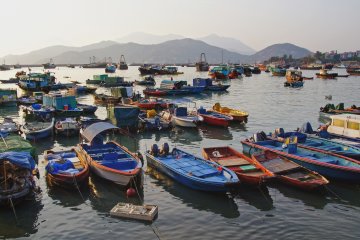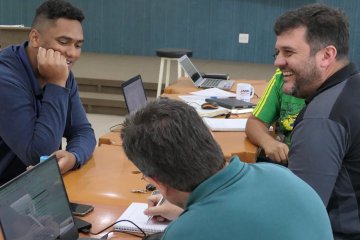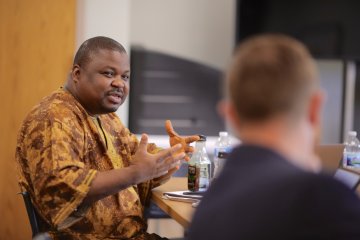Pastoral Training for Geneva's Exiles
 Patrick J. O'Banion
Patrick J. O'BanionEditors’ Note: This article is the fourth in a four-part series exploring how diaspora missions is not new. We have lessons to learn and examples to follow as we minister to and through the immigrant communities among us. (See also parts one, two, and three.)
In a series of short articles, I’ve been placing “diaspora ministry” into a broader historical context to emphasize that the church has always viewed it as a way of engaging the Great Commission. I’ve shown how pivotal moments in the history of missions led to a focus on ministering to sojourners who then carried the gospel message forward, often to unreached peoples. It turns out that the apostolic church naturally reacted to Christ’s promises and commands in Matthew 28:18–20 by doing diaspora ministry and that modern missions movement not infrequently developed—both at home and abroad—into ministry focused on diaspora communities, whether Koreans living in China or Japanese living in California.
This final article takes us to sixteenth-century Geneva, where pastoral training and diaspora ministry intersected. Centers of Protestantism like Geneva became launching pads from which the gospel, recovered during the Reformation, went forth to Europe and beyond. In large part, they did so by ministering to exiles and refugees, especially by training them for gospel ministry.
The French Exile
John Calvin knew well what it meant to be a refugee, having fled France in 1534 for political, legal, and religious reasons. He hoped for a life of bookish solitude. Instead, he found himself pressed into service as a reformer in Geneva, only to be dismissed and exiled when the city fathers decided they didn’t like how ille Gallus (“that Frenchman,” as council records dismissively identified him) planned to implement reform. There followed a sojourn in Strasburg, where a patient Martin Bucer molded the brilliant (if tightly wound) young theologian into a pastor.
Geneva soon asked Calvin to finish what he’d started, and he accepted. But until 1559, just a few years before his death, he wasn’t a citizen, merely a sojourner praying for a Protestant France. He had no formal political power and couldn’t even vote in civil elections.
Among the many legacies of this “buttoned-up French exile” was his ministry to refugees who arrived in Geneva. He advocated for the displaced, and his Geneva became a bustling hub of hospitality. This was the context within which Reformed Protestantism—in and around Geneva, across Europe, and even further afield—became the most dynamic Reformation movement of the age.
Theological Training for Outsiders
Beginning in the 1530s, waves of French exiles in Geneva mingled with English, Scots, Spaniards, Italians, Dutch, Hungarians, and Poles. Some stopped only briefly; others put down roots. In an age when urban planning and social welfare programs were mostly unknown, Geneva roughly doubled in size to accommodate the influx of huddled, traumatized masses. Some families could support themselves, but others carried only the clothes on their backs, the knowledge in their heads, and the skills in their hands.
Then as now, the arrival of immigrants sparked debate and tension, and Calvin’s support for the refugees cost him politically. But the creation of the French Purse, a privately endowed charitable fund, helped Geneva care for so many without undermining the town’s financial stability. So the refugees came, and they were welcomed.
Some stayed only briefly, like John Knox (c. 1514–72), the Scot who remembered Geneva as the “most perfect school of Christ since the disciples,” or Girolamo Zanchi (1516–90), who had fled Italy with the Inquisition on his heels. Others stayed put. Italian converts to Protestantism like the Diodatis, Turrettinis, Colandrinis, Burlamachis, and dozens of other families found a home in Geneva and joined its Italian-speaking congregation. They built businesses and produced some of the most celebrated pastors and theologians in the town’s history. Giovanni Diodati served both as a pastor and a professor at the Genevan Academy for nearly fifty years and made the first Italian translation of the Bible from the original languages. Benedetto Turrettini (1588–1631) and his son François (1623–87) became professors of theology and churchmen. The son, who’s better known to Anglophone audiences as Francis Turretin, wrote a richly influential theological textbook that remained the gold standard in Reformed circles for two centuries.
This points the way to a striking conclusion: Calvin (and Geneva) didn’t merely care for the refugees’ physical needs. They committed significant resources specifically and strategically to the pastoral and theological training of outsiders. To the Diodatis and Turrettinis add the examples of Thomas Bodley (the Marian exile who founded the renowned Library at Oxford) and Caspar Olevian (co-author of the Heidelberg Catechism) along with hundreds and hundreds of other non-citizens who studied at the Genevan Academy after its founding in 1559. Alumni from the refugee community supplied pastors not only for churches back in France—more than 220 between just 1555 and 1562—but also for those in and around Geneva. Parishes in Geneva’s hinterlands were staffed, to a man, by diaspora pastors until 1570, and, within the city itself, until 1594.
“Calvin (and Geneva) didn’t merely care for the refugees’ physical needs. They committed significant resources specifically and strategically to the pastoral and theological training of outsiders.”
Mentoring Diaspora Ministers
The work of discipleship and teaching didn’t end once sojourners departed. Calvin and other professors and pastors continued to correspond with those who left to serve abroad, offering encouragement, admonition, and advice. Calvin’s letters to Girolamo Zanchi, for example, helped the Italian navigate a protracted controversy into which he stumbled while teaching at Strasburg.
Face-to-face mentoring and letter writing were supplemented by the printed word. His formal writings often incorporated the goal of serving those who had sojourned in Geneva before returning home or moving on to minister elsewhere. Take the case of the young Frenchman François Daniel. He came to Geneva to attend the Academy against his parents’ wishes. Daniel’s father wanted him to study law, but the son was drawn toward the pastorate. Calvin mediated and, eventually, the boy returned home, but the reformer continued to advocate for and correspond with him. In 1561, Daniel wrote from Orleans asking for resources to continue his theological education, and Calvin obliged by sending a copy of his Institutes of the Christian Religion—virtually a one-volume seminary education. The young man went on to serve the French Reformed congregation of La Rochelle as a pastor for decades.
Calvin’s Geneva was hardly unique. Reformation cities like Strasburg, London, Emden, Neuchâtel, Antwerp, Zurich, Basel, Lausanne, and others, similarly and regularly extended hospitality to refugees. Reformed centers for the training of gospel ministers shaped diaspora pastors from all over Europe, and often it was diaspora professors who did the training—the Spanish Cypriano de Valera (at Cambridge), the Italian Peter Martyr Vermigli (at Oxford and Zurich), the German Martin Bucer (at Strasburg and Cambridge), and the French Franciscus Junius (at Heidelberg and Leiden), among many others.
Global Immigration and Gospel Opportunities
Diaspora ministry, or the training of refugee pastors, wasn’t done perfectly in Geneva (or, for that matter, anywhere else). Especially in the early years, alumni of the Academy found that there were significant gaps in their education. Hospitality could be restricted to those who saw eye-to-eye with Calvin. Some, like the Spanish Casiodora de Reina, finding that he couldn’t toe the reformer’s line, soon moved onto more accommodating environs. Others, like the anti-Trinitarian Michael Servetus, who was burned at the stake, stuck around too long.
Yet we should be encouraged to discover that, despite many imperfections, Reformation Europe owned the responsibility to sacrificially commit resources over the long term for the love of neighbors in need. But there’s another important takeaway here. Calvin and others saw the influx of outsiders as an opportunity for advancing the gospel through the training of future ministers. The goal was to spread the gospel in Europe and beyond; the members of refugee communities who sheltered in Geneva, studied at the Academy, corresponded with Calvin, and drew from his writings put their shoulders to the plow and did much of that work.
This series of articles began by noting that, as of 2017, more than a quarter of a billion people worldwide were living outside their country of origin. The same responsibility that the Genevan church bore—to love neighbors in need for Christ’s sake—confronts Christ’s Church today. Many exiles and refugees live abroad, not willingly, but on account of their confession that Christ is Lord. Our responsibility toward those who “are of the household of faith” is clear (Galatians 6:10). But describing this as an obligation to fulfill or a responsibility to bear doesn’t actually capture its weightiness. The pregnant reality is that diaspora ministry has been a mainstay in the faithful declaration of God’s name among the nations.
“diaspora ministry has been a mainstay in the faithful declaration of God’s name among the nations.”
By ministering to diaspora communities in our midst, we minister to those abroad as well. As Earnest Sturge put it, “The work is one.” That work, especially raising up gospel ministers to proclaim the unsearchable riches of Christ (Ephesians 3:8) to their communities at home and abroad, is Great Commission work. It will bear fruit, for Christ will always be with his church, to the end of the age (Matthew 28:20).
Patrick J. O'Banion (PhD, Saint Louis University) is a former professor of history and author of several books, including Deza and Its Moriscos: Religion and Community in Early Modern Spain and a new translation of Girolamo Zanchi's The Spiritual Marriage between Christ and His Church. He currently serves with TLI, teaching future pastors and church leaders in seminaries around the world.



